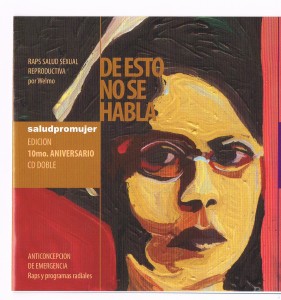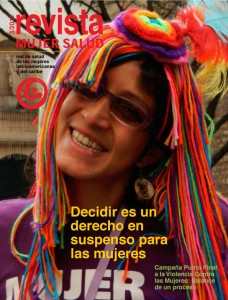Female sexual and reproductive health is key to development. However, prevention and monitoring services are not always accessible and, in the worst cases, disregarded. As a result, innumerable feminist organizations have taken to the Internet to encourage discussion and activism, to address doubts and share information. The effectiveness of these sites is certainly inspiring.
We dedicate this post to four sexual and reproductive health programmes that are currently using online networks to reaffirm the value of basic rights.
Saludpromujer (Pro-women health) and Taller Salud (Health Workshop) in Puerto Rico, the Latin America and Caribbean Women's Health Network based in Chile, and the National Latina Institute for Reproductive Health (NLIRH) in New York.

The double CD "We Don't Talk About That," made to commemorate the 10th anniversary of Saludpromujer, can be listened to on their website.
1. Saludpromujer [es] began as part of a study about women at the Cayey Campus of the University of Puerto Rico, and was transferred to the Gynocelogy and Obstetrics Department of the Medical School of the University of Puerto Rico, under the direction of Yamila Azize Vargas. Part of its mission is to encourage “curricular changes and investigation of female reproductive health issues that are excluded and stigmatized in the education of the science of health, such as sexuality, contraception and abortion.”
Saludpromujer also coordinates the Caribbean Initiative on Abortion and Contraception, a network that promotes research and the training of health professionals in more that 15 Caribbean countries. It also maintains the Rosa Gonzáles Documentation Centre which houses books, magazines and videos [es]. On their website you will find scientific research, and radio broadcasts recorded under the name “De Esto No se Habla” [es] (We Don't Talk About This), in which health professionals discuss essential issues in medical school classrooms.
2. Taller Salud is based in Loíza, Puerto Rico and it was founded in 1979 by Carmen Guzmán and Eugenia Acuña who worked in New York against the widespread sterilization of poor Latin American women who were mainly Puerto Rican. Once they returned to Puerto Rico they continued to condemn the excessive sterilization of women, and they have focused on guaranteeing the right to contraception and abortion. Today, this organisation, coordinated by Alana Feldman, integrates into their work awareness of issues including reproductive health, sexuality, vaginal health, the impact of violence of women's health and the health of young girls.
Also, as part of its mission to “create safe spaces sharing experiences essentials for the body and comprehensive health” it regularly organised workshops that are accessible to the community and health professionals. On their Facebook page there is a calendar of the next workshops about, among other things, empowerment, eating disorders and HIV/ STD prevention strategies for young people. On their blog Desde el el barrio de Adolfina (From Adolfina's Neighborhood), which is dedicated to the heroine, Adolfina Villanueva [es], the available resources from their Documentation and Information Centre are listed.
Last year, Taller Salud launched the project El Tenderete Fotográfico [es] (Clothesline Photography), an art competition to commemorate the International Day of Action for Women's Health (celebrated on 28 May). In the video below, the work of the finalists and the winner (Dora Irrizary) is shown.
http://www.youtube.com/watch?v=LcX7sARnbyA&feature=player_embedded#!

Even though the recent ecomomic cut-backs have made the print-version of the Women's Health Journal impossible, it is still being published in its digital format on the RSMLAC website.
3. On 28 May, 1984 the Regional Women's Health Meeting was held for the first time in Colombia. During the six-day workshop a diverse group of feminists decided, among other things, to create the Latin America and Caribbean Women's Health Network (RSMLAC). In the beginning, the network was coordinated by Isis International, a non-governmental organization based in Chile, but from 1995 it began functioning autonomously. The General Coordinator is Nirvana Gonzáles Rosa, a feminist with extensive experience in the defence of women's human rights, both in her country, Puerto Rico, and the region in general.
The current counselors are Télia Negrão (Brazil), Natalia Pineda (Colombia), Lise Marie Dejéan (Haiti), María Eugenia Romero (Mexico), Alma Odette Chacón de León (Guatemala), Norma Benítez (Paraguay), Sergia Galván (Dominican Rupublic). RSMLAC organise the Itinerant University, from 1996 to 2004 it followed the implementation of the agreements made at the United Nations International Conference on Population and Development and it works in favor of the decriminalization of abortion in Chile, as well as other projects. On this site you can see their most recent campaigns, join discussions on the blog [es] and access the Women's Health journal.
4. The National Latina Institute for Reproductive Health (NLIRH) works to “ensure the fundamental human right to reproductive health and justice for Latinas, their families and their communities through public education, community mobilization and policy advocacy.” This is what their website tells us. The access to abortion, immigrant rights, the needs of the lesbian, gay, bisexual, transgender and queer community LGBTQ are also included in their work agenda.
works to “ensure the fundamental human right to reproductive health and justice for Latinas, their families and their communities through public education, community mobilization and policy advocacy.” This is what their website tells us. The access to abortion, immigrant rights, the needs of the lesbian, gay, bisexual, transgender and queer community LGBTQ are also included in their work agenda.
This organisation, established in New York City in 1994, also offers the workshops, or “webinars” Latinas Organizing for Leadership and Advocacy (LOLA) via the internet, with the aim of encouraging Latina leaders who wish to get involved in the development of fair and inclusive public policies. On joining their electronic mailing-list or their Facebook page, you will receive information about the next local and national training sessions and activities.
Below, the video explains the vision of the National Latina Institute for Reproductive Health, directed by Jessika González-Roja:






